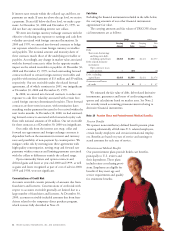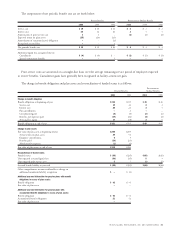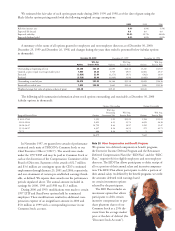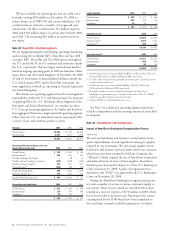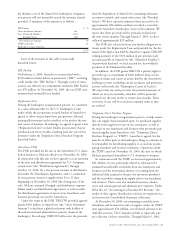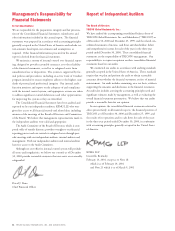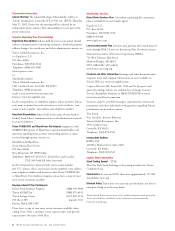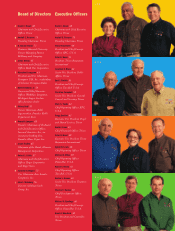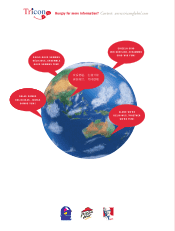Pizza Hut 2000 Annual Report Download - page 66
Download and view the complete annual report
Please find page 66 of the 2000 Pizza Hut annual report below. You can navigate through the pages in the report by either clicking on the pages listed below, or by using the keyword search tool below to find specific information within the annual report.64 TRICON GLOBAL RESTAURANTS, INC. AND SUBSIDIARIES
restaurant general managers purporting to represent all
current and former Taco Bell restaurant general managers
and assistant restaurant general managers in California.
The lawsuit alleged violations of California wage and hour
laws involving unpaid overtime wages, and violations of the
State Labor Code’s record-keeping requirements. The com-
plaint also included an unfair business practices claim.
Plaintiffs claimed individual damages ranging from $10,000
to $100,000 each. On September 17, 1998, the court certi-
fied a class of approximately 3,000 current and former
assistant restaurant general managers and restaurant general
managers. Taco Bell petitioned the appellate court to review
the trial court’s certification order. The petition was denied
on December 31, 1998. Taco Bell then filed a petition for
review with the California Supreme Court, and the petition
was subsequently denied. Class notices were mailed on August
31, 1999 to over 3,400 class members. Trial began on
January 29, 2001. Before conclusion of the trial, the parties
reached an agreement to settle this matter, and entered into
a stipulation of discontinuance of the case. This settlement
agreement is subject to approval by the court of the terms
and conditions of the agreement and notice to the class with
an opportunity to object and be heard. We have provided
for the costs of this settlement in unusual items.
Other Litigation
C&F Packing Co., Inc. v. Pizza Hut, Inc. This action was
originally filed in 1993 by C&F Packing Co., Inc., a Chicago
meat packing company (“C&F”), in the United States District
court for the Northern District of Illinois. This lawsuit alleges
that Pizza Hut misappropriated various trade secrets relating to
C&F’s alleged process for manufacturing a precooked Italian
sausage pizza topping. C&F’s trade secret claims against Pizza
Hut were originally dismissed by the trial court on statute of
limitations grounds. That ruling was later overturned by the
U.S. Court of Appeals for the Federal Circuit in August 2000
and the case was remanded to the trial court for further pro-
ceedings. On remand, Pizza Hut moved for summary judgment
on its statute of limitations defense. That motion was denied
in January 2001. This lawsuit is in the discovery phase and
no trial date has been set. Similar trade secret claims against
another defendant were tried by a jury in late 1998 and the
jury returned a verdict for C&F. Judgment on that verdict
was affirmed by the U.S. Court of Appeals for the Federal
Circuit in August 2000.
TRICON believes that C&F’s claims are without merit
and is vigorously defending the case. However, in view of the
inherent uncertainties of litigation, the outcome of this case
cannot be predicted at this time. Likewise, the amount of any
potential loss cannot be reasonably estimated.
Obligations to PepsiCo After Spin-off
In connection with the October 6, 1997 Spin-off from
PepsiCo, we entered into separation and other related agree-
ments (the “Separation Agreements”), governing the Spin-off
transaction and our subsequent relationship with PepsiCo.
These agreements provide certain indemnities to PepsiCo.
The Separation Agreements provided for, among other
things, our assumption of all liabilities relating to the restau-
rant businesses, including the Non-core Businesses, and our
indemnification of PepsiCo with respect to these liabilities.
We have included our best estimates of these liabilities in
the accompanying Consolidated Financial Statements.
Subsequent to Spin-off, claims were made by certain Non-
core Business franchisees and a purchaser of one of the
businesses. To date, we have resolved these disputes within
amounts previously recorded.
In addition, we have indemnified PepsiCo for any costs or
losses it incurs with respect to all letters of credit, guarantees
and contingent liabilities relating to our businesses under
which PepsiCo remains liable. As of December 30, 2000,
PepsiCo remains liable for approximately $139 million
related to these contingencies. This obligation ends at the
time PepsiCo is released, terminated or replaced by a quali-
fied letter of credit. We have not been required to make any
payments under this indemnity.
Under the Separation Agreements, PepsiCo maintains full
control and absolute discretion with regard to any combined
or consolidated tax filings for periods through October 6,
1997. PepsiCo also maintains full control and absolute dis-
cretion regarding any common tax audit issues. Although
PepsiCo has contractually agreed to, in good faith, use its
best efforts to settle all joint interests in any common audit
issue on a basis consistent with prior practice, there can be
no assurance that determinations made by PepsiCo would
be the same as we would reach, acting on our own behalf.
Through December 30, 2000, there have not been any deter-
minations made by PepsiCo where we would have reached
a different determination.
We also agreed to certain restrictions on our actions to
help ensure that the Spin-off maintained its tax-free status.
These restrictions, which were generally applicable to the two-
year period following the Spin-off Date, included among
other things, limitations on any liquidation, merger or con-
solidation with another company, certain issuances and
redemptions of our Common Stock, our granting of stock
options and our sale, refranchising, distribution or other dis-
position of assets. If we failed to abide by these restrictions or
to obtain waivers from PepsiCo and, as a result, the Spin-off
fails to qualify as a tax-free reorganization, we will be obli-
gated to indemnify PepsiCo for any resulting tax liability,
which could be substantial. No payments under these indem-
nities have been required or are expected to be required.
Additionally, PepsiCo is entitled to the federal income tax
benefits related to the exercise after the Spin-off of vested
PepsiCo options held by our employees. We expense the pay-
roll taxes related to the exercise of these options as incurred.


